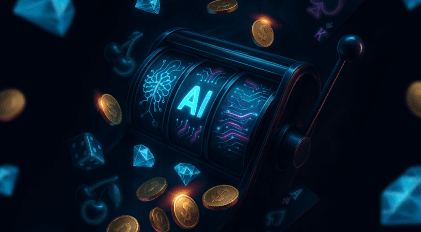
2025-08-26 13:23:00
Responsible Gambling in 2025: Can Technology Help Us Play Smarter?
Online gambling has always kept pace with progress. First, there were roulette wheels on clunky PCs, then apps allowed you to place a bet while waiting for the bus. Today, however, the spotlight is on technologies that are changing the very essence of the game: artificial intelligence, blockchain, VR, and 5G. But here's what's truly important: these tools work not only for entertainment but also for player safety. So, what's the deal: do they make us more responsible players or just get us hooked in new ways? Let's figure it out.
AI: Your Personal Assistant... and Strict Coach
Imagine AI in a casino as that friend who remembers not only your coffee order but also how you grimace if they get the sugar wrong. Only now, this "friend" is on a booster. It analyzes what you play, when you place bets, and even how you react to wins and losses. The result? You'll get slot recommendations you might genuinely like, and bonuses will arrive at the most opportune moment.
But AI has another, more caring side. Algorithms can track warning signs: bets larger than usual, night sessions when you're typically a "quick-evening session type." In such cases, the system doesn't stay silent: sometimes it's just a pop-up saying, "Hey, you've been playing for two hours now - maybe take a break?"
Casinos that have already tested these "nudges" say it really works: the number of prolonged losing sessions decreases, and requests for self-exclusion drop. Not bad for an algorithm that never sleeps.
The Fine Line Between Care and Temptation
This is where it gets tricky. Personalization is a double-edged sword. The same AI that "cares" for you can also push you to play in the next moment. You just lost, you're about to close the tab… and bam! - a bonus offer appears on the screen that's impossible to refuse. A coincidence? No.
This is precisely why regulators worldwide are tightening the screws. The minimum goal is balance. Personalization should be like Spotify suggesting a new playlist, not like a pushy acquaintance whispering, "Come on, one more bet! You're lucky today!". The line between help and pressure is very thin, and the best platforms are those that don't cross it.
The Future is Already Here: Not Just for Fun
Of course, AI isn't the only star at this party. The industry is flooded with new tools:
- VR and AR - create the atmosphere of a real casino: imagine putting on a headset and walking through a neon-lit hall, chatting with other players without leaving your couch.
- Blockchain - a casino can no longer just say "trust us." Every bet and every card deal can be verified. If the casino cheats, it will be immediately obvious.
- 5G and mobile technology - forget about buffering streams. You can play a live dealer game even on a train without a single lag.
- Live dealer games - it's like FaceTiming a dealer from Las Vegas while you sit at home in your pajamas. It's informal, social, and very close to the real thing.
All these improvements sound great, but they also make gambling incredibly accessible. And the main challenge is to ensure that "easy to start" doesn't turn into "impossible to stop."
Playing by the Future's Rules
Technology itself is neutral. It's neither good nor bad - it all depends on how it's applied. Will the temptation be cranked up to the max, or will real "brakes" be built into the system?
The ideal scenario looks like this:
- AI warns of risks before they become a problem.
- Blockchain ensures game fairness and payment transparency.
- VR delivers incredible experiences but with built-in limits that prevent you from losing touch with reality.
- And the player always understands how it all works under the hood and can manage their own experience.
The Bottom Line: Smarter ≠ More, Smarter = Safer
In 2025, "responsible gambling" isn't a boring paragraph at the end of the terms and service. It's a reality supported by technology, baked right into the experience. Thanks to AI, blockchain, and other technologies, casinos can transform into places where entertainment and safety go hand in hand. But only if ethics are behind the innovation.
Because let's face it: playing smarter doesn't mean "winning every jackpot." It means knowing when enough is enough. And if technology can help us find that balance, then the future of gambling might not only be more technological but also truly safer.



